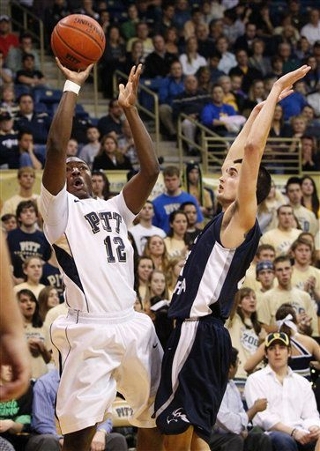Madison Square Garden | New York City, NY | Tip: Approx. 6:20 P.M. CT | TV: ESPN2 For the second time in as many years, the Texas Longhorns and Pitt Panthers meet in an early-season tournament championship. But for fans of both programs, tonight’s matchup will look very different from the 78-62 Texas win in last year’s CBE Classic at Kansas City.
Jamie Dixon is excited about his team’s potential In that one, the Panthers were crippled by injuries and academic issues, while the Longhorns used four players who have since graduated or left for the NBA. Meanwhile, the Panthers have healed and added another year of experience. In short, the tables have definitely turned. Pittsburgh now boasts an incredibly deep and talented roster, even if most of their players aren’t household names outside of the Big East. The Panthers have always dealt with the underdog label, despite being one of the most successful teams of the decade. Tonight, however, they come in with a top-five ranking and high expectations for success in March and April. By the numbers As with every Jamie Dixon-coached team, this year’s Panther squad is well-disciplined, defensively-suffocating, and highly efficient. On paper, there’s very few games that they should ever lose. The Pitt brand of basketball has long been slow-down basketball, and through the first four games of the 2010-11 season, that trend has continued. The team’s 66.8 possessions per game is ranked 239th-fastest in the nation — or 107th-slowest, if you’re a glass-half-empty kind of fan. It will certainly be a contrast in styles tonight, as the Longhorns are clipping along at the 19th-fastest pace in NCAA hoops, with 71.7 possessions per game. As usual, the strength of the Panther offense is on the glass. They are cleaning up more than half of their offensive rebounding opportunities, which makes them nearly unstoppable when combined with a 53.4% effective field-goal percentage. They are fairly steady with the ball, turning it over just 13 times per game, which equates to only 18% of their possessions.
Ashton Gibbs is an explosive scorer Despite shooting just 3-of-10 from behind the arc in last night’s win over Maryland, the Panthers are loaded with long-range threats. Junior guard Ashton Gibbs led the Big East in three-point percentage two seasons ago, and has made more than 48% of his long-range attempts so far this year. Meet the Panthers Pitt’s team is loaded with overachieving role players that any coach would kill to have on his roster. They run eight or nine deep on any given night, and their team mentality shows in every aspect of the game. On offense, quick, crisp ball movement leads to open looks and tons of assists. On defense, most players can adequately guard any position, allowing the Panthers to constantly switch on screens. The aforementioned Gibbs is a very difficult matchup for any opponent, as he is the true definition of a combo guard. When he’s not knocking down threes, he can sink it from anywhere on the court or dish out a quick assist to the rest of his talented team. In the summer of 2009, Gibbs worked his way up to a starting role on the U-19 national team coached by Dixon, and won a gold medal in the process. Tiny Travon Woodall joins Gibbs in the backcourt, and as his 9.5 points per game attest, his height doesn’t hold him back. Just 5’11”, Woodall is lightning-quick and constantly causes defenses to have to rotate and help when he zips past his man. While he’s yet to start a game this season, this sixth man is averaging more than 24 minutes per game and has logged 15 assists.
Brad Wanamaker can score at will for Pitt Brad Wanamaker is one of three starting seniors, and he contributes in every way. He’s yet another lockdown defender for Coach Dixon, and his 17 points per game come from a variety of positions. Wanamaker can comfortably play as the off-guard or the small forward, and his versatility allows the team to throw out many different lineup combinations. In the middle, Gary McGhee is another senior leader for the Panthers, although he isn’t going to wow you on offense. He cleans up misses and puts in the easy ones, chipping in just four points per game. McGhee is a big body that makes it difficult for opponents to score inside, and he constantly cleans up the defensive glass to limit the other team to one-and-done possessions. In last year’s meeting in Kansas City, the big man logged a double-double against the Horns with 11 points and 10 boards. The third senior in Dixon’s starting five is Gilbert Brown, a fifth-year man who was academically ineligible when these teams met last year. This summer, he led the team in scoring during their overseas trip to Ireland, and is averaging nearly 10 points a game so far this season. Brown is yet another offensive threat for the Panthers that can explode at any moment, as evidenced by the three times he posted 20-plus points last year. At power forward, Nigerian-born redshirt freshman Talib Zanna is making a quick impact. He was the star of last night’s game, leading Pitt with both 14 points and 11 boards. He only has four blocks in four games, but he has the length and reputation of a serious post defender. Like Texas big man Alexis Wangmene, he was discovered as a part of the NBA’s Basketball Without Borders program. He also speaks five languages, which means he’ll likely be Dick Vitale’s most-loved linguistic topic since Sydmill Harris. The deep Panther bench is loaded with talent, and these athletic reserves will likely make a big difference in tonight’s game. While Texas often uses Wangmene, Jai Lucas, and Matt Hill to give the starters a blow, the Panthers can continue attacking when they go to the bench. In addition to Woodall, the Panthers can also count on quality performances from Dante Taylor, Lamar Patterson, and Nasir Robinson. Taylor is Pitt’s first McDonald’s All-American in the Jamie Dixon era, and he’s primed for a breakout season. He spent much of his freshman year as a role player, but is leading the team in blocks despite playing just 15 minutes a game. He’s also one of Pitt’s top rebounders, grabbing 6.5 per contest. Patterson is an athletic small forward who hopes to make a splash after playing just 10 games last year before suffering a season-ending injury. He sees just over 17 minutes per game off the bench, and contributes a quiet 4.8 points and three rebounds a night. Robinson, meanwhile, missed the first three games of the year before making his debut against Maryland. Despite being just 6’5″, he knows how to work inside and will grind out a few points every game. He’s yet another solid defensive player for Dixon and the Panthers, as the Longhorns will discover in just a few hours. Keys to the game As always, the number one key when facing the Panthers is to attack the defensive glass. Pitt doesn’t miss that many shots, so the Longhorns simply cannot allow the Panthers to continue their trend of reclaiming more than half of their misses. If Texas can hold Pitt to one-and-done possessions, they have a chance to escape with the tournament title. Against a physical team, there’s always the danger of picking up a ton of fouls. For a very thin Texas team, they absolutely must avoid foul trouble. Wangmene and Hill have given nice chunks of minutes against the likes of Louisiana Tech and Navy, but Texas will struggle if that pair has to play 20-plus minutes each against a very talented Pittsburgh frontcourt. Additionally, the Longhorns have found lots of easy points this year by forcing mistakes. Texas must pressure the Panther ballhandlers and look for fast break buckets. Gibbs is a talented scorer, but he’s had problems in the past with coughing it up. He seems to have settled down this year, with just under three turnovers per game, but perhaps a high-pressure approach from the Horns can give him the yips. If Texas can force some Panther mistakes, they can also likely dictate the tempo. While it’s certainly easier to impose your will as a slower team, in past years the Longhorns have been able to make some perennially-slow opponents pick up the pace. Yes, it’s a gamble to push the pace with a short bench, and Texas is probably tired after playing an overtime game that ended just 19 hours before this one tips. But it’s much easier to win when you are playing to your own strengths, so the Longhorns should throw caution to the wind and turn this into a track meet. As with last night’s game, the start time for tonight’s championship is going to be impacted by the consolation game that precedes it. There is typically a 20-minute window between games, so look for this one to start no earlier than 6:20 back in Texas. |
One Response to “Longhorns battle Panthers for 2KSports title”












on 19 Nov 2010 at 2:01 pm # Tweets that mention Longhorn Road Trip » Longhorns battle Panthers for 2KSports title -- Topsy.com
[…] This post was mentioned on Twitter by Texas Longhorns Buzz, Ryan Clark. Ryan Clark said: Preview tonight's 2KSports title clash with LRT's breakdown of the Pitt Panthers: http://ow.ly/3cGjy […]